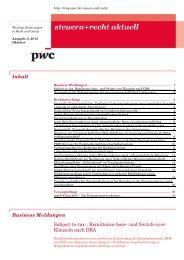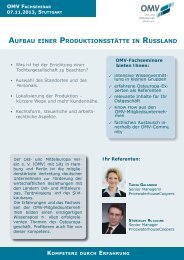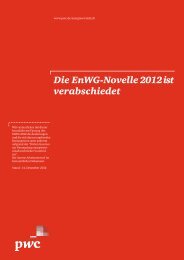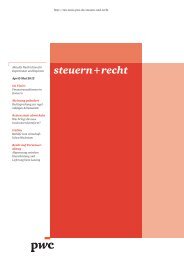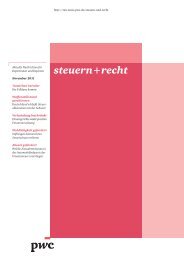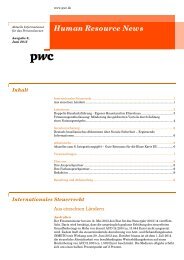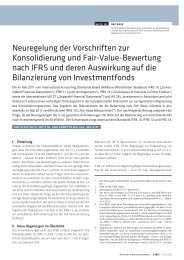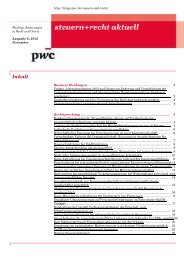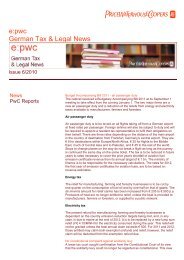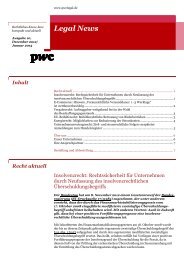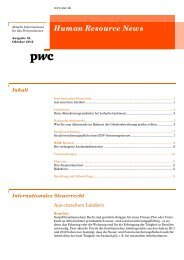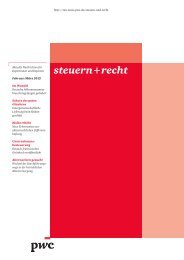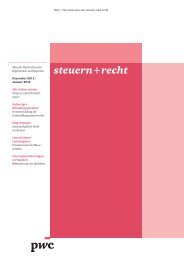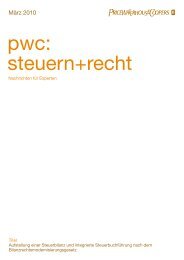Download legal-news-issue-7-2011 - PwC Blogs
Download legal-news-issue-7-2011 - PwC Blogs
Download legal-news-issue-7-2011 - PwC Blogs
You also want an ePaper? Increase the reach of your titles
YUMPU automatically turns print PDFs into web optimized ePapers that Google loves.
Tax & Legal News October 13, <strong>2011</strong> 13<br />
need to examine the proprietor's personal residence. The customer invoices <strong>issue</strong>d by the<br />
business were reverse-chargeable in Germany, regardless of where the proprietor lived.<br />
The ECJ case reference is C-421/10 Stoppelkamp judgment of October 6, <strong>2011</strong>.<br />
Dutch exit tax excessively burdensome?<br />
A Dutch captive finance subsidiary of a UK group replaced its Dutch management<br />
personnel with UK employees. At the same time, it closed it offices in Holland. However,<br />
it remained in existence as a BV, albeit managed from the UK. It thus became resident in<br />
the UK within the meaning of the double tax treaty by reference to its place of<br />
management. Dutch law allows companies to move abroad, but imposes a “final<br />
settlement tax” on the hidden reserves in undervalued assets and off-balance sheet<br />
intangibles. This final settlement tax is justified on the grounds that the hidden reserves<br />
had accumulated in Holland, but could not be taxed there once the company had<br />
relocated its tax residence. However, the company protested that the tax was a hindrance<br />
of its freedom of establishment, given that a company moving within Holland would not<br />
be subject to it. It also made the point that the only significant item subject to the tax (in<br />
this case) was the unrealised exchange gain on a loan in sterling to a UK associated<br />
company. Once the company took up UK tax residence, the pound became its functional<br />
currency and euro/sterling exchange rate movements ceased to be relevant to its taxation.<br />
The company’s reference to the freedom of establishment brought the case before the<br />
ECJ. The advocate general has just published her opinion supporting, in principle, the<br />
Dutch concept of exit taxation manifested in the final settlement tax, whilst objecting to<br />
the immediate levy as being unnecessarily harsh. As such, the tax is discriminatory,<br />
because a company moving its place of management within Holland would not be subject<br />
to it. However, the discrimination is justified by the need to preserve the international<br />
allocation of taxing rights as agreed in the double tax treaties. On the other hand, actually<br />
collecting the tax at the moment of departure goes beyond what is necessary to achieve a<br />
legitimate object. The company remains registered in Holland and thus continues to be<br />
subject to Dutch accounting and reporting formalities. It is therefore not exceptionally<br />
difficult for the Dutch authorities to follow its affairs to the extent necessary to be sure of<br />
collecting the tax on disposal of the asset or other form of release of the hidden reserves.<br />
The advocate general also suggests the court rule that the taxation, when finally levied,<br />
should take losses between the dates of exit and asset realisation into account. The tax<br />
burden is thus reduced to the level that a domestic taxpayer would bear on realisation of a<br />
hidden reserve. However, she rejects the company’s argument that the hidden reserve<br />
disappears once the company’s functional currency changes to the currency of the debt as<br />
not being a matter for Dutch taxation. The tax should therefore be payable when the asset<br />
is realised (repayment of the loan) and the taxable gain should be the lower of the<br />
unrealised gain on change of residence and the gain that the company would have realised<br />
on loan repayment had its functional currency remained the euro.<br />
This case has a number of parallels in German law - the taxation levied on the transfer of<br />
a function as a prime example. It is therefore of possibly wider interest than might at first<br />
sight appear.<br />
The ECJ case reference is C-371/10 National Grid Indus, opinion of September 8, <strong>2011</strong>.



